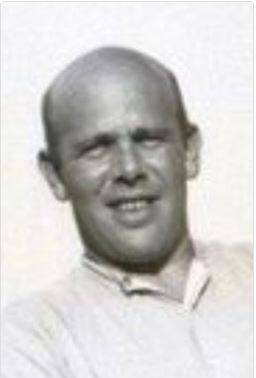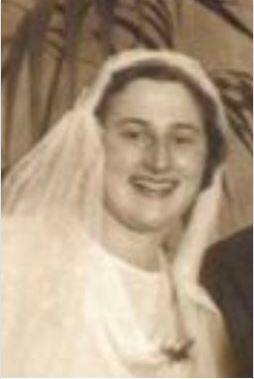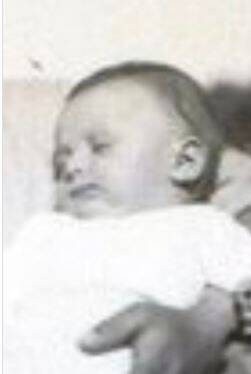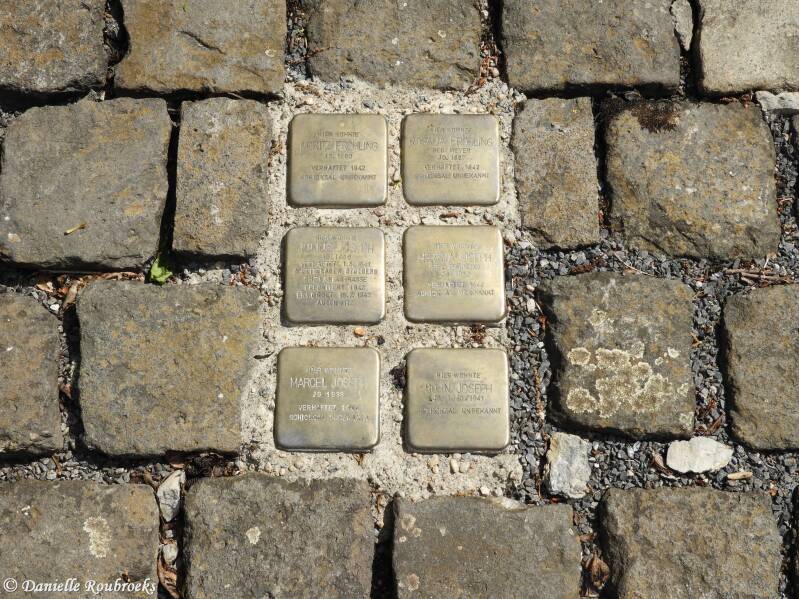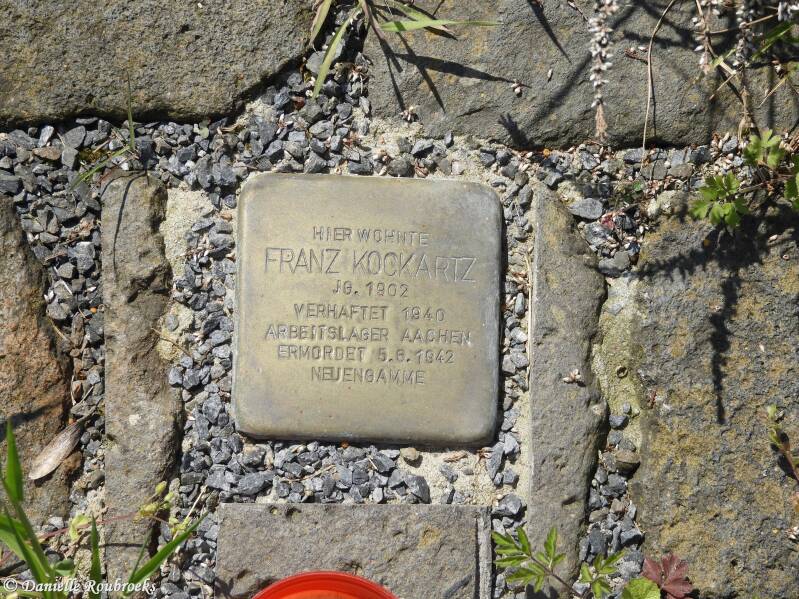Walhorn - Stolpersteine
Information: Wikipedia
A Stolperstein literally "stumbling stone", metaphorically a "stumbling block" is a sett-size, 10 by 10 centimetres (3.9 in × 3.9 in) concrete cube bearing a brass plate inscribed with the name and life dates of victims of Nazi extermination or persecution.
The Stolpersteine project, initiated by the German artist Gunter Demnig in 1992, aims to commemorate individuals at exactly the last place of residency—or, sometimes, work—which was freely chosen by the person before he or she fell victim to Nazi terror, euthanasia, eugenics, was deported to a concentration or extermination camp, or escaped persecution by emigration or suicide. As of 29 March 2018, over 67,000 Stolpersteine have been laid in 22 countries, making the Stolpersteine project the world's largest decentralized memorial.
The majority of Stolpersteine commemorate Jewish victims of the Holocaust. Others have been placed for Sinti and Romani people (then also called "gypsies"), homosexuals, the physically or mentally disabled, Jehovah's Witnesses, black people, members of the Communist Party, the Social Democratic Party, and the anti-Nazi Resistance, the Christian opposition (both Protestants and Catholics), and Freemasons, along with International Brigade soldiers in the Spanish Civil War, military deserters, conscientious objectors, escape helpers, capitulators, "habitual criminals", looters, and others charged with treason, military disobedience, or undermining the Nazi military, as well as Allied soldiers.
List of Stolpersteine in the city of Walhorn
Kirchbuschweg 89: HERTHA JOSEPH
JULIUS JOSEPH
MARCEL JOSEPH
MORITZ FROHLING
ROSALIA FROHLING
SOHN JOSEPH
Merolser Straße 18: FRANZ KOCKARTZ
Kirchbuschweg 89
hier wohnte
MORITZ FROHLING
Jg. 1880
verhaftet 1942
schicksal unbekannt
Kirchbuschweg 89
here lived
MORITZ FROHLING
born 1880
arrested 1942
fate unknown
Kirchbuschweg 89
hier wohnte
ROSALIA FROHLING
geb. Meyer
Jg. 1887
verhaftet 1942
schicksal unbekannt
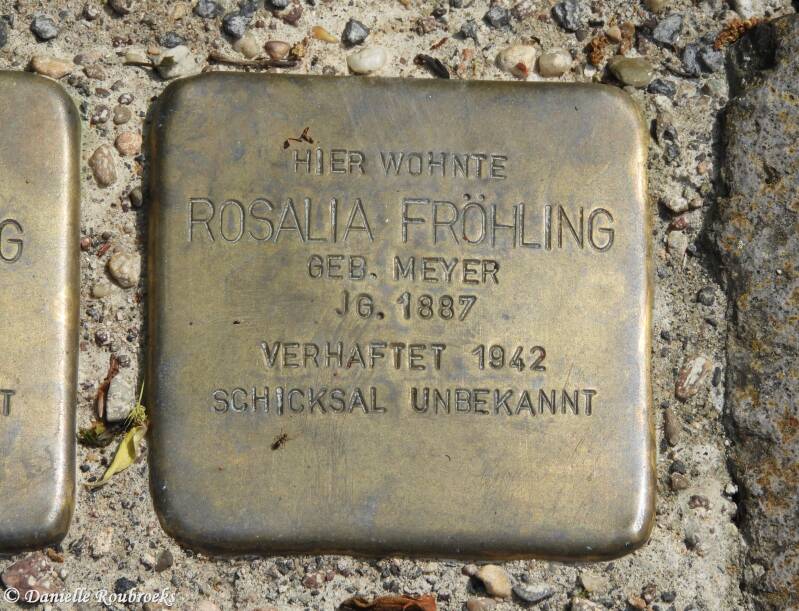
Kirchbuschweg 89
here lived
ROSALIA FROHLING
nee Meyer
born 1887
arrested 1942
fate unknown
Kirchbuschweg 89
hier wohnte
JULIUS JOSEPH
Jg. 1906
verhaftet 1.5.1941
arbeitslager Stolberg
Rhe Naniastrasse
deportiert 1942
ermordet 16.7.1942
Auschwitz
Kirchbuschweg 89
here lived
JULIUS JOSEPH
born 1906
arrested 1.5.1941
labour camp Stolberg
Rhe Naniastreet
deported 1942
murdered 16.7.1942
Auschwitz
Kirchbuschweg 89
hier wohnte
HERTHA JOSEPH
geb. Fröhling
Jg. 1912
verhaftet 1942
schicksal unbekannt
Kirchbuschweg 89
here lived
HERTHA JOSEPH
nee Fröhling
born 1912
arrested 1942
fate unknown
Kirchbuschweg 89
hier wohnte
MARCEL JOSEPH
Jg. 1938
verhaftet 1942
schicksal unbekannt
Kirchbuschweg 89
here lived
MARCEL JOSEPH
born 1938
arrested 1942
fate unknown
Kirchbuschweg 89
hier wohnte
SOHN JOSEPH
Jg. 1940/1941
schicksal unbekannt
Kirchbuschweg 89
here lived
SOHN JOSEPH
born 1940/1941
fate unknown
Julius Joseph, who came from Hessen, lived with his wife Hertha and his little son Marcel in what is now Kirchbuschweg, where he ran a farm. Later he also took in his in-laws from Rheinland-Pfalz, who, like him and his wife, had fled from the Nazis.
Julius Joseph was arrested on May 1, 1941, first taken to a labor camp in Stolberg and then deported to Auschwitz. He was murdered there on July 16, 1942. In the same year his wife, who was expecting a second child, and his son were arrested. Their trail is lost.
Merolser Straße 18
hier wohnte
FRANZ KOCKARTZ
Jg. 1902
verhaftet 1940
arbeitslager Aachen
ermordet 5.6.1942
Neuengamme
Merolser Straße 18
here lived
FRANZ KOCKARTZ
born 1902
arrested 1940
work camp Aachen
murdered 5.6.1942
Neuengamme
Franz Kockartz was a postman and he delivered the draft orders for the young soldiers. He warned the families in advance. Then he was betrayed, picked up and never came back. After being sent to a labor camp in Aachen, Franz Kockartz was deported to Neuengamme concentration camp. The father of four children was murdered there on June 5, 1942.







